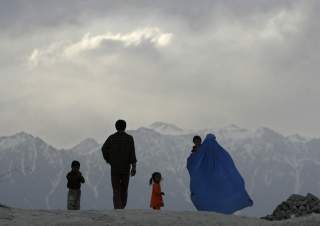Washington’s Gamble in Afghanistan
The U.S. decision to pursue talks with the Taliban is rife with risk, but it’s the right decision.
Pakistan, which causes problems for U.S. policy because of its support for many of the militants that Washington aims to combat, is the exception here. Its deep ties to the Taliban ensure that it would retain, if not increase, its influence in Afghanistan in the event of a U.S withdrawal. However, this influence hasn’t exactly waned during the long period of the U.S. military presence in Afghanistan.
Second, it’s debatable that a U.S. withdrawal would cause Afghanistan to become a sanctuary for international terror.
Al Qaeda retains a presence in the Afghanistan-Pakistan region, but its capacities—particularly after the elimination of many of its top leaders there—are seriously degraded. Even if given a sanctuary, it would struggle to plan large-scale, international attacks. Moreover, the Taliban—even if it rejects Washington’s demand to sever ties with international terrorists—has no incentive to go out of its way to accommodate Al Qaeda and offer it shelter. The Taliban, a formidable fighting force, doesn’t need Al Qaeda’s money, or its foot soldiers, as it did years back.
The Islamic State, meanwhile, boasts several hundred fighters in Afghanistan, and it has claimed attacks there. However, the Islamic State is no friend of the Taliban’s—or of any other major militant group in the country or broader region. The Islamic State is an Al Qaeda rival. The Taliban, and most militant actors in Afghanistan, are aligned with Al Qaeda. Additionally, the Islamic State’s embrace of the Salafist sect of Islam puts it at odds with the Taliban and most other jihadists of the Afghanistan-Pakistan region, most of whom adhere to Deobandism. Unsurprisingly, instead of seeking accommodation with Islamic State, the Taliban has done battle with it. In effect, Islamic State faces a hostile neighborhood in Afghanistan that will constrain any efforts to establish a sanctuary.
In the end, from a stability risk lens, the most likely outcome of a U.S. withdrawal is a more destabilized Afghanistan that delivers major victories for the Taliban but falls short of becoming a terrorist sanctuary. This is a dangerous scenario—but one that doesn’t pose as much of a threat to U.S. interests as would a situation where global jihadists are able to use Afghanistan as a base to plan attacks on American targets around the world.
In the event of a withdrawal, Washington’s best option for trying to mitigate the risk of a rapidly destabilizing Afghanistan would be ensuring a continuation of funds to the Afghan security forces—even if at considerably lower levels than they are presently.
Indeed, if anything is going to cause Afghanistan to collapse into chaos and civil war, it’s not America cutting and running—it’s America cutting off funds to an Afghan military that is deeply dependent on American largesse.
When the Soviets pulled out of Afghanistan, the Soviet-backed Afghan government did not collapse. It survived a few more years. Only after the fall of the Soviet Union, when assistance to Afghanistan was cut off, did the Afghan government fall and large-scale conflict broke out.
Predictability Amid Uncertainty
The coming weeks and months are fraught with uncertainty for Afghanistan. There may or may not be a deal between the United States and the Taliban, and if there is a deal, then it may or may not lead to formal peace talks between the insurgents and the Afghan government. Afghanistan’s broader political future—and in particular how ongoing negotiations with the Taliban might impact a presidential election scheduled for September—is also up in the air.
Washington’s immediate plans in Afghanistan, by contrast, are quite predictable. Plans A, B, and C revolve around talks with the Taliban. Ultimately, talking to the Taliban will make it easier to prepare for, and rationalize, an inevitable departure—one that an impatient President Trump is likely to push for sooner rather than later.
That U.S. withdrawal from Afghanistan, whenever it comes, will be messy and risky—but not necessarily one with consequences as catastrophic as those urging a stay-the-course policy may suggest.
Michael Kugelman is senior associate for South Asia and deputy director of the Asia Program at the Woodrow Wilson Center.
Image: Reuters

